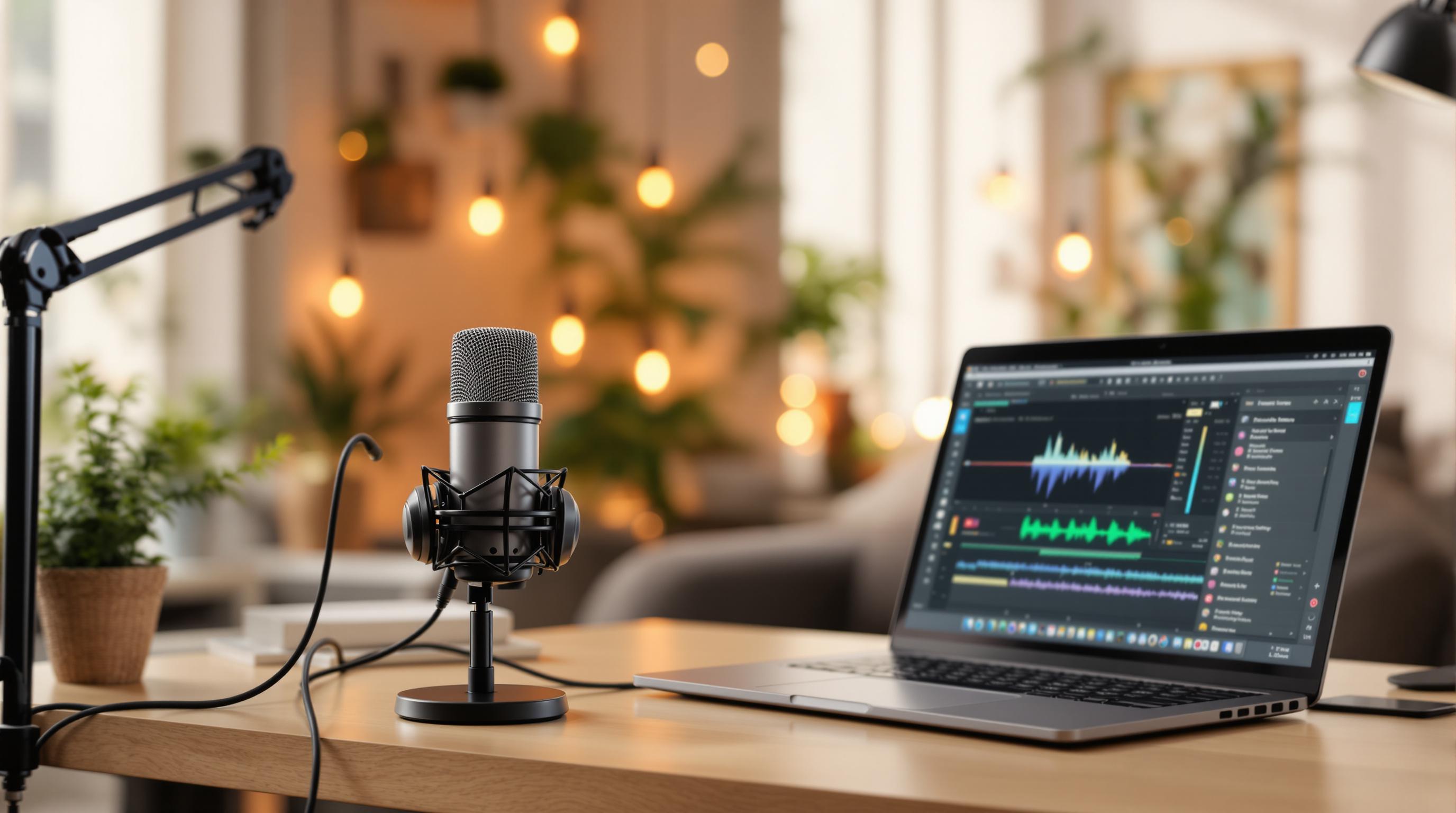Want to keep your podcast safe in 2024? Here's what you need to know:
- Use encrypted communication channels
- Store and share files securely
- Control access to your recordings
- Choose safe remote recording software
- Protect guest information
- Handle audio files carefully
- Follow online safety best practices
Key security steps:
- Use a VPN for remote recording
- Encrypt audio files before sharing
- Set up access controls and multi-factor authentication
- Pick recording software with end-to-end encryption
- Get clear permission from guests
- Use cloud storage with zero-knowledge encryption
- Create strong, unique passwords
Quick Comparison of Secure Recording Tools:
| Tool | Key Security Feature | Price |
|---|---|---|
| Riverside.fm | Local recording with cloud backup | $15+/month |
| SquadCast | Local WAV file recording | $12+/month |
| Zoom | End-to-end encryption | $18+/month |
Remember: No software is 100% secure. Stay vigilant, keep everything updated, and follow best practices to protect your podcast.
Related video from YouTube
What is Secure Remote Podcast Recording
Secure remote podcast recording is all about capturing audio from different places while keeping everything safe and private. It's a big deal for podcasters in 2024, especially with so many people working remotely.
Here's what it boils down to:
- Using encrypted channels to talk
- Storing and sharing files safely
- Controlling who can access recordings
Main Security Risks
When recording remotely, podcasters need to watch out for:
- Data breaches: Someone getting their hands on your files or guest info
- Unwanted access: Hackers crashing your recording sessions
- Copyright issues: People using or sharing your content without permission
To tackle these problems, podcasters are using special tools. In fact, 60% of company podcasts now use dedicated recording software with beefed-up security.
"The best remote recording software can capture high-quality video and audio of people in different locations using local recording."
This local recording feature is a game-changer. It keeps your audio quality top-notch, even if your internet connection is acting up.
Check out how some popular secure recording tools stack up:
| Tool | Key Security Feature | Price |
|---|---|---|
| Riverside.fm | Local recording with cloud backup | $15+/month |
| SquadCast | Local WAV file recording | $12+/month |
| Zoom | End-to-end encryption | $18+/month |
When picking a remote recording tool, look for:
- End-to-end encryption
- Secure file storage
- Access controls
- Regular updates
These features will help keep your podcast safe and sound, no matter where you're recording from.
Key Security Steps for Remote Recording
Want to keep your podcast safe? Here's how:
Use Encrypted Communication
Protect your podcast with encrypted channels. A VPN creates a secure tunnel for remote recording. It's like a force field for your data.
"End-to-end encryption is like a secret code only you and the recipient can crack", says a SpiderOak cybersecurity expert.
Store and Share Files Safely
Keep your podcast files under lock and key:
- Use encrypted storage (like SpiderOak or Tresorit)
- Encrypt audio files before sharing
- Pick secure file-sharing platforms
Windows users: Right-click > Properties > Advanced > Check "Encrypt contents to secure data"
Mac users: Create an encrypted folder in Disk Utility with a strong password.
Control Access
Guard your recording platforms and content:
| Do This | Why? |
|---|---|
| Set access controls | Only the right people get in |
| Use multi-factor auth | Add an extra security layer |
| Update security settings | Keep protection fresh |
| Watch file access | Spot unauthorized use |
Don't forget: Teach your team about safe file sharing and phishing risks.
Picking Safe Remote Recording Software
Security matters when choosing remote podcast recording software. Here's what you need to know:
Key Security Features
- End-to-end encryption
- Local recording
- Separate audio tracks
- Automatic backups
- Access controls
Top Secure Recording Tools Compared
| Software | Key Features | Pricing |
|---|---|---|
| Riverside.fm | Local recording, separate tracks | Free (2 hrs), $19/mo (5 hrs) |
| SquadCast | Progressive upload, auto backups | Free (1 hr), $15/mo (10 hrs) |
| Zencastr | Local recording, built-in editing | 14-day trial, $20/mo (unlimited) |
Riverside.fm records locally on each device. This helps with internet issues and keeps your content safe.
SquadCast uses progressive upload and auto backups. Your recording stays safe even if your connection drops.
Zencastr offers local recording and separate tracks. This gives you more control in post-production.
Try the free versions first. It's the best way to find what works for you.
No software is 100% secure. Use strong passwords, keep your software updated, and follow online safety best practices.
sbb-itb-cdb7710
Keeping Guest Info Safe
Protecting your podcast guests' privacy is key. Here's how to do it right:
Get Clear Permission
Always get your guests to agree before you record. Use a podcast guest agreement that covers:
- Publishing rights
- Using their name and photo
- Content editing rules
- Ad policies
Pro tip: Use HelloSign or DocuSign for quick, easy signing.
Follow the Law
Know the data protection laws:
- Check if you're collecting personal info (PII)
- Have a clear Privacy Policy
- Follow privacy laws for your audience
PII includes names, emails, phone numbers, addresses, and device IDs.
| Where You Collect PII | What You Collect |
|---|---|
| Email sign-ups | Name, email |
| Contact forms | Name, email, message |
| Guest inquiries | Name, contact info, topic |
| Sponsor forms | Company, contact, budget |
| Analytics | IP addresses, device info |
| Ads | Demographics, interests |
Need to protect a guest's identity? Try:
- Voice distortion
- Virtual voiceovers
- Pitch correction
Handling Audio Files Safely
Protecting your podcast audio files is a must. Here's how to do it right:
Encrypting Audio Files
Encryption is your best friend. Use cloud storage with zero-knowledge encryption:
- Sync.com: Built-in zero-knowledge encryption
- pCloud: Zero-knowledge encryption in pCloud Crypto folder
- Icedrive: Twofish encryption with encrypted file previews
| Service | Free Storage | Paid Plan (2TB) | Encryption Type |
|---|---|---|---|
| Sync.com | 5GB | $96/year | Zero-knowledge |
| pCloud | 10GB | $95.88/year | Zero-knowledge (paid) |
| Icedrive | 10GB | $71.88/year (1TB) | Twofish |
Set a private encryption key. Write it down somewhere safe or use a password manager.
Backups and Safe Cloud Storage
Use the 3-2-1 backup strategy:
- 3 copies of your data
- 2 copies on different local devices
- 1 copy offsite
For local backups, try MiniTools Shadowmaker to clone data. For offsite backups, consider:
| Service | Features | Best For |
|---|---|---|
| IDrive | Continuous backups, 30 versions of files | Flexible storage needs |
| Backblaze | Unlimited storage, 30-day version history | Single computer backup |
| Arq Premium | Hourly backups, 5 computer support | Multi-device users |
Set up automated backups. It's less work and keeps your files safe.
Label your files clearly. Use a system with the date, episode number, and title. Organize with folders and subfolders to manage space.
Online Safety Tips for Podcasters
Podcasters: protect your online presence with these key security steps:
Using Strong Passwords
Create tough, unique passwords for all accounts:
- 16+ characters
- Mix upper/lowercase, numbers, symbols
- No personal info or common words
Use a password manager to:
- Generate complex passwords
- Store them securely
- Use unique passwords everywhere
Michael Bazzell, host of The Privacy, Security, & OSINT Show, says:
"Password Managers & 2FA Revisited"
This shows the importance of strong passwords and two-factor authentication.
Two-Step Login
Two-step login (2FA) adds extra security:
- Protects even if your password's compromised
- Makes unauthorized access harder
Gavin Gaddis, freelance journalist and podcaster, advises:
"Make enabling 2FA your first step towards strengthening podcasting security in the present so it might have a long-term future."
Set up 2FA on Podbean:
1. Log in
2. Go to "My Account"
3. Turn on "2-Step Verification"
4. Choose authentication app or email verification
Keeping Software Up-to-Date
Update software regularly to fix security weak spots:
- Set up automatic updates when possible
- Check weekly if auto-updates aren't available
- Update everything: OS, recording software, editing tools, browsers, plugins
Wrap-Up
Let's recap how to keep your podcast safe in 2024:
- Use strong, unique passwords and a password manager
- Turn on two-step login for your accounts
- Keep your software up-to-date
- Encrypt your files
- Use encrypted cloud storage and make backups
- Teach your guests about secure remote recording
Podcast security isn't a one-time thing. Stay on top of new threats and security measures to protect your show and listeners.
Want to start or grow a secure podcast? Check out Podcast Launch Strategy (https://podcastlaunchstrategy.com) for a full course on podcasting, including security tips.




